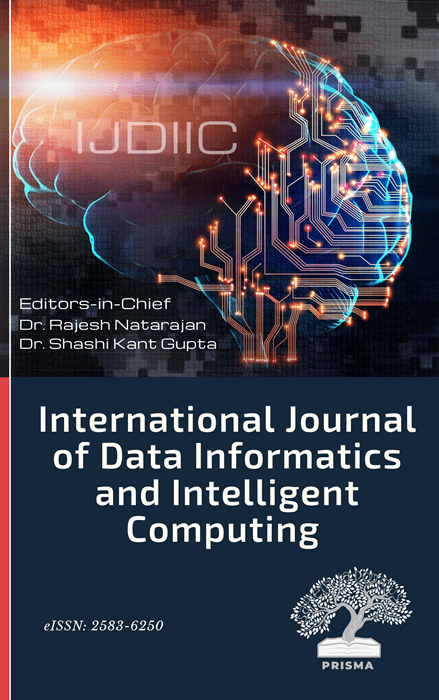Advancing Cyber Resilience for Autonomous Systems with Novel AI-based Intrusion Prevention Model
DOI:
https://doi.org/10.59461/ijdiic.v3i3.121Keywords:
Autonomous Systems, Intrusion Prevention, Cyber Threats, Gannet optimized Mutated k-Nearest Neighbour (GO-MKNN), Intrusion Prevention Systems (IPS)Abstract
Autonomous systems rely on intricate algorithms and are networked, which makes them more susceptible to cyber-attacks. The contexts of traditional intrusion prevention systems (IPS) are frequently difficult with the ever-changing nature of cyber threats. To overcome these limitations, we propose the Gannet optimized-mutated k-nearest Neighbour (GO-MKNN) approach as a novel customized intrusion prevention paradigm for self-governing systems. To improve detection accuracy and adaptability, the GO-MKNN algorithm combines the optimization powers of Gannet algorithms with the durability of the MKNN approach. Initially, this study obtained a dataset from CICIDS2017 CAN-intrusion, which was utilized for automobile attacks, and suggested designing additional IDS for the CAN system to train our suggested model. Following dataset collection, data cleaning and normalization were performed. Python was utilized to simulate our proposed method. The suggested method's effectiveness was evaluated in terms of Precision (%), Accuracy (%), F1-score (%) and recall (%). The experimental findings of the research may contribute to the development of a strong framework for intrusion detection that would guarantee the dependability and safety of autonomous vehicles.
Downloads
References
A. Kott and P. Theron, “Doers, Not Watchers: Intelligent Autonomous Agents Are a Path to Cyber Resilience,” IEEE Secur. Priv., vol. 18, no. 3, pp. 62–66, May 2020, doi: 10.1109/MSEC.2020.2983714.
O. Onishchenko, K. Shumilova, S. Volyanskyy, Y. Volyanskaya, and Y. Volianskyi, “Ensuring Cyber Resilience of Ship Information Systems,” TransNav, Int. J. Mar. Navig. Saf. Sea Transp., vol. 16, no. 1, pp. 43–50, 2022, doi: 10.12716/1001.16.01.04.
Z. Lian, P. Shi, and C.-C. Lim, “Adaptive Resilient Control for Cyber-Physical Systems Under Cyberattack and Input Saturation,” IEEE Trans. Ind. Informatics, vol. 19, no. 5, pp. 6513–6524, May 2023, doi: 10.1109/TII.2022.3198699.
S. Colabianchi, F. Costantino, G. Di Gravio, F. Nonino, and R. Patriarca, “Discussing resilience in the context of cyber physical systems,” Comput. Ind. Eng., vol. 160, p. 107534, Oct. 2021, doi: 10.1016/j.cie.2021.107534.
B. Zou, P. Choobchian, and J. Rozenberg, “Cyber resilience of autonomous mobility systems: cyber-attacks and resilience-enhancing strategies,” J. Transp. Secur., vol. 14, no. 3–4, pp. 137–155, Dec. 2021, doi: 10.1007/s12198-021-00230-w.
Z. Wan, K. Swaminathan, P.-Y. Chen, N. Chandramoorthy, and A. Raychowdhury, “Analyzing and Improving Resilience and Robustness of Autonomous Systems,” in Proceedings of the 41st IEEE/ACM International Conference on Computer-Aided Design, New York, NY, USA: ACM, Oct. 2022, pp. 1–9. doi: 10.1145/3508352.3561111.
H. A. Kholidy, “Autonomous mitigation of cyber risks in the Cyber–Physical Systems,” Futur. Gener. Comput. Syst., vol. 115, pp. 171–187, Feb. 2021, doi: 10.1016/j.future.2020.09.002.
C. Rieger, C. Kolias, J. Ulrich, and T. R. McJunkin, “A Cyber Resilient Design for Control Systems,” in 2020 Resilience Week (RWS), IEEE, Oct. 2020, pp. 18–25. doi: 10.1109/RWS50334.2020.9241300.
N. K. Rajagopal et al., “Future of Business Culture: An Artificial Intelligence-Driven Digital Framework for Organization Decision-Making Process,” Complexity, vol. 2022, pp. 1–14, Jul. 2022, doi: 10.1155/2022/7796507.
E. Refaee et al., “Secure and Scalable Healthcare Data Transmission in IoT Based on Optimized Routing Protocols for Mobile Computing Applications,” Wirel. Commun. Mob. Comput., vol. 2022, pp. 1–12, Jun. 2022, doi: 10.1155/2022/5665408.
R. K. Kaushal et al., “Using Mobile Computing to Provide a Smart and Secure Internet of Things (IoT) Framework for Medical Applications,” Wirel. Commun. Mob. Comput., vol. 2022, pp. 1–13, Oct. 2022, doi: 10.1155/2022/8741357.
R. Natarajan, G. H. Lokesh, F. Flammini, A. Premkumar, V. K. Venkatesan, and S. K. Gupta, “A Novel Framework on Security and Energy Enhancement Based on Internet of Medical Things for Healthcare 5.0,” Infrastructures, vol. 8, no. 2, p. 22, Feb. 2023, doi: 10.3390/infrastructures8020022.
J. Thaker, N. K. Jadav, S. Tanwar, P. Bhattacharya, and H. Shahinzadeh, “Ensemble Learning-based Intrusion Detection System for Autonomous Vehicle,” in 2022 Sixth International Conference on Smart Cities, Internet of Things and Applications (SCIoT), IEEE, Sep. 2022, pp. 1–6. doi: 10.1109/SCIoT56583.2022.9953697.
S. Mewada, D. Sreenivasa Chakravarthi, S. J. Sultanuddin, and S. Kant Gupta, “Design and Implementation of a Smart Healthcare System Using Blockchain Technology with A Dragonfly Optimization-based Blowfish Encryption Algorithm,” in The Data-Driven Blockchain Ecosystem, Boca Raton: CRC Press, 2022, pp. 137–153. doi: 10.1201/9781003269281-10.
Downloads
Published
How to Cite
Issue
Section
License
Copyright (c) 2024 Sujatha Krishna, Paryati

This work is licensed under a Creative Commons Attribution-ShareAlike 4.0 International License.








